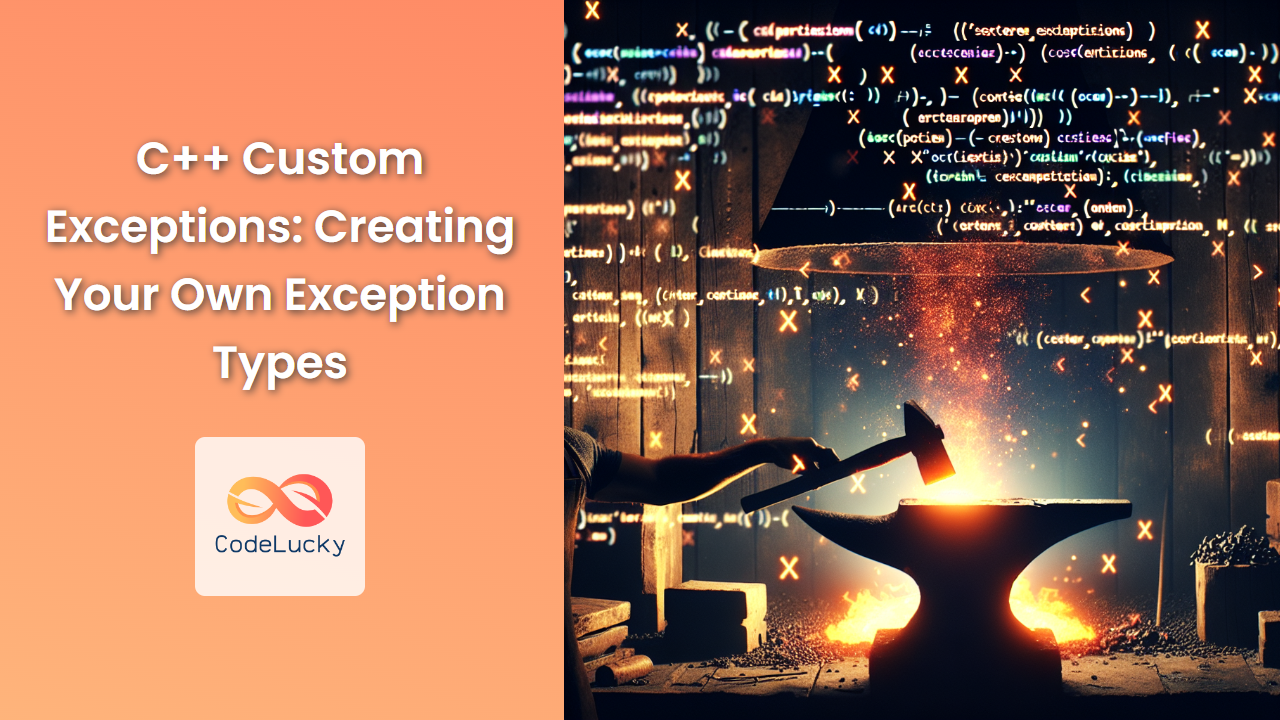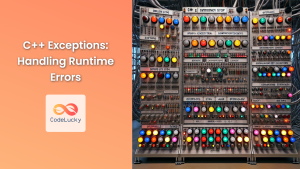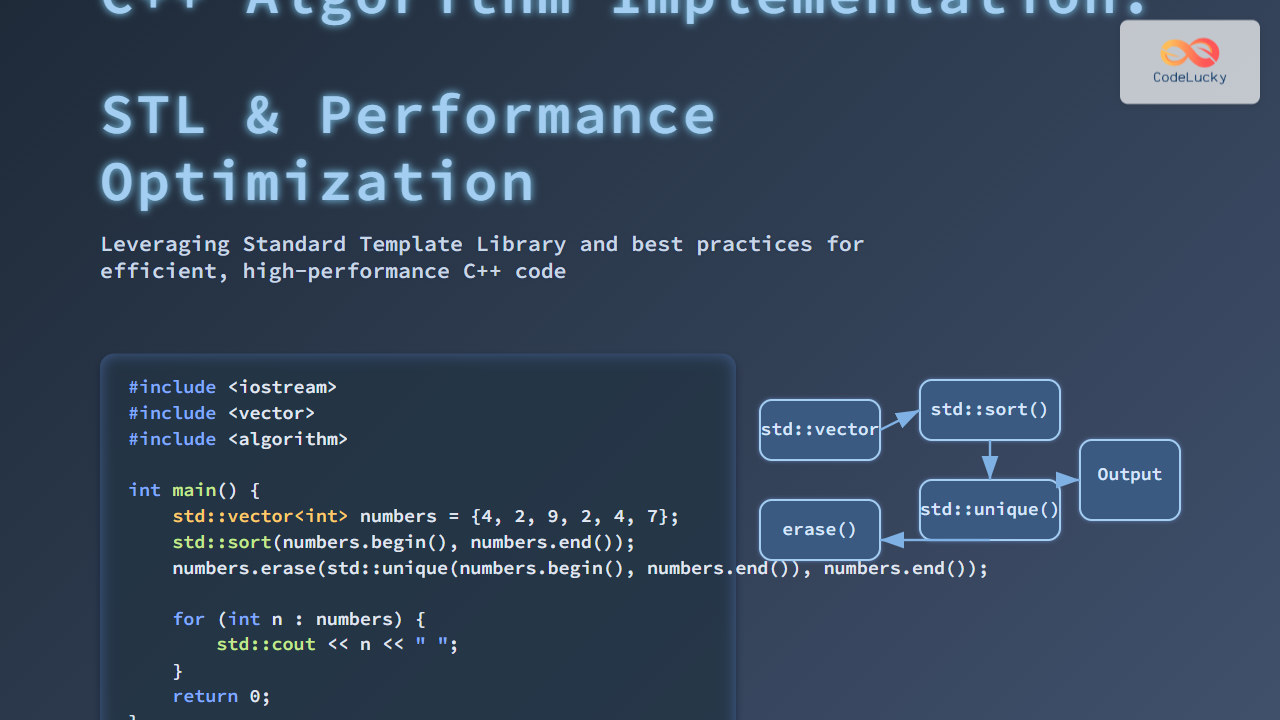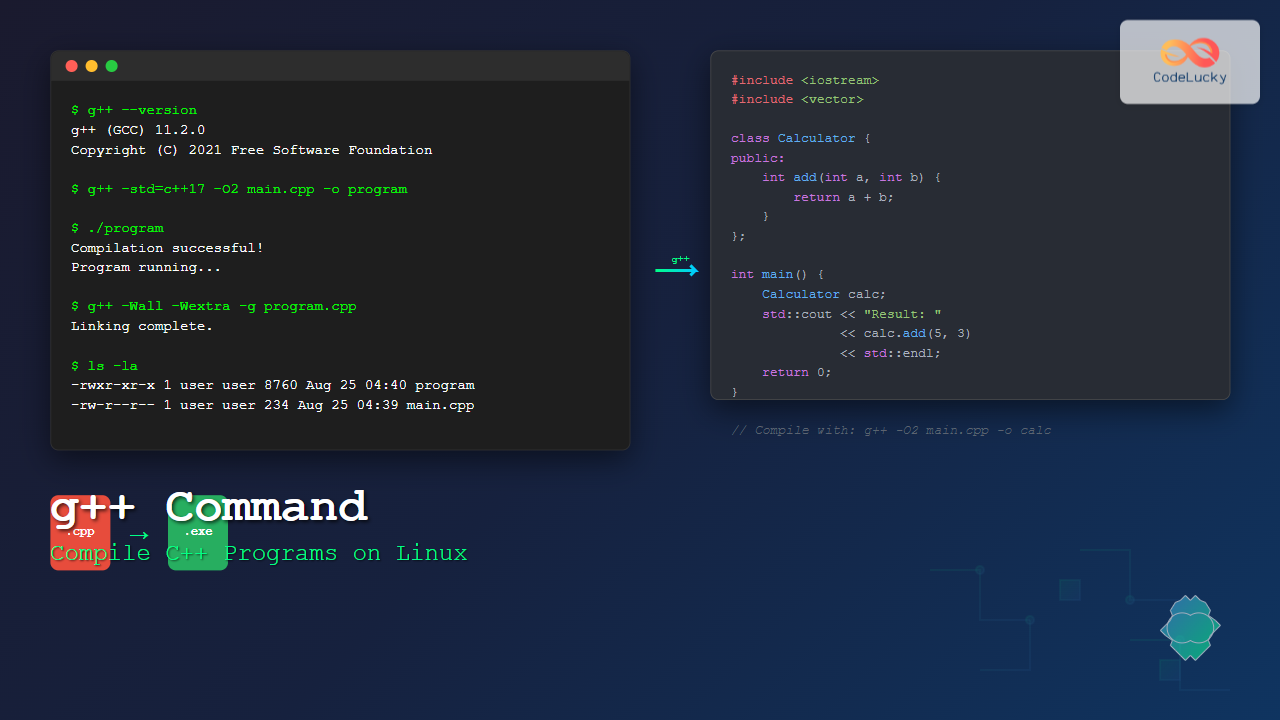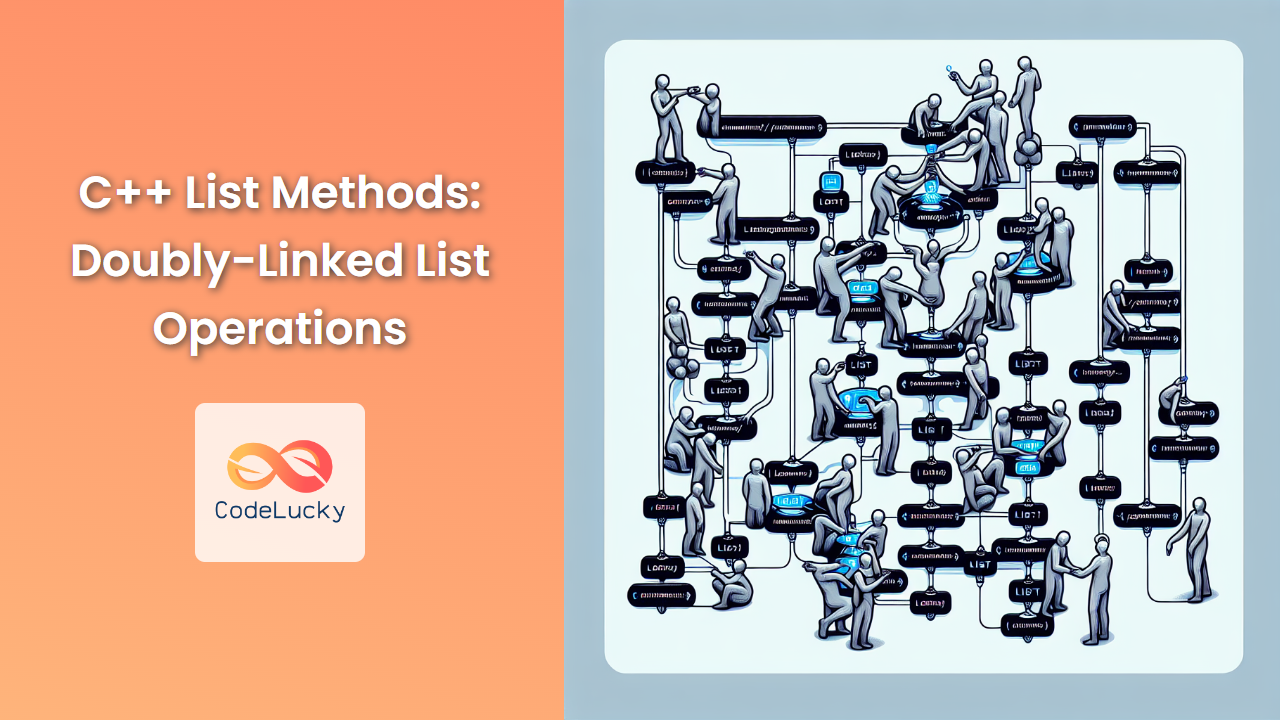In the world of C++ programming, exception handling is a crucial aspect of writing robust and reliable code. While C++ provides a set of standard exceptions, there are often situations where you need to create custom exceptions tailored to your specific application needs. This article will dive deep into the process of creating and using custom exceptions in C++, providing you with the knowledge and tools to enhance your error-handling capabilities.
Understanding the Need for Custom Exceptions
Before we delve into the intricacies of creating custom exceptions, let's explore why they are necessary:
-
Specificity: Custom exceptions allow you to create error types that are specific to your application domain, making error handling more precise and meaningful.
-
Improved Debugging: By using custom exceptions, you can provide more detailed error information, making it easier to identify and fix issues in your code.
-
Better Code Organization: Custom exceptions can help you categorize and organize different types of errors in your application, leading to cleaner and more maintainable code.
-
Enhanced Error Handling: With custom exceptions, you can implement more sophisticated error-handling strategies tailored to your application's needs.
Creating a Basic Custom Exception
Let's start by creating a simple custom exception in C++. We'll derive our custom exception from the standard std::exception class.
#include <exception>
#include <string>
class CustomException : public std::exception {
private:
std::string message;
public:
explicit CustomException(const std::string& msg) : message(msg) {}
const char* what() const noexcept override {
return message.c_str();
}
};
In this example, we've created a CustomException class that:
- Inherits from
std::exception - Stores a custom error message
- Overrides the
what()function to return our custom message
Now, let's see how we can use this custom exception:
#include <iostream>
void riskyFunction(int value) {
if (value < 0) {
throw CustomException("Negative value not allowed");
}
std::cout << "Processing value: " << value << std::endl;
}
int main() {
try {
riskyFunction(5); // This will work fine
riskyFunction(-3); // This will throw our custom exception
} catch (const CustomException& e) {
std::cerr << "Caught CustomException: " << e.what() << std::endl;
}
return 0;
}
Output:
Processing value: 5
Caught CustomException: Negative value not allowed
Creating a Hierarchy of Custom Exceptions
In more complex applications, you might want to create a hierarchy of custom exceptions. This allows for more granular error handling and better organization of different error types.
Let's create a hierarchy of exceptions for a hypothetical file processing application:
#include <exception>
#include <string>
class FileException : public std::exception {
protected:
std::string message;
public:
explicit FileException(const std::string& msg) : message(msg) {}
const char* what() const noexcept override {
return message.c_str();
}
};
class FileNotFoundException : public FileException {
public:
explicit FileNotFoundException(const std::string& filename)
: FileException("File not found: " + filename) {}
};
class FilePermissionException : public FileException {
public:
explicit FilePermissionException(const std::string& filename)
: FileException("Permission denied: " + filename) {}
};
class FileCorruptException : public FileException {
public:
explicit FileCorruptException(const std::string& filename)
: FileException("File is corrupt: " + filename) {}
};
Now, let's use these custom exceptions in a file processing function:
#include <iostream>
#include <fstream>
void processFile(const std::string& filename) {
std::ifstream file(filename);
if (!file.is_open()) {
throw FileNotFoundException(filename);
}
// Simulating a permission check
if (filename == "restricted.txt") {
throw FilePermissionException(filename);
}
// Simulating file corruption check
if (filename == "corrupt.txt") {
throw FileCorruptException(filename);
}
std::cout << "Processing file: " << filename << std::endl;
// File processing logic would go here
}
int main() {
try {
processFile("example.txt"); // This will work fine
processFile("nonexistent.txt"); // This will throw FileNotFoundException
processFile("restricted.txt"); // This will throw FilePermissionException
processFile("corrupt.txt"); // This will throw FileCorruptException
} catch (const FileNotFoundException& e) {
std::cerr << "File not found error: " << e.what() << std::endl;
} catch (const FilePermissionException& e) {
std::cerr << "Permission error: " << e.what() << std::endl;
} catch (const FileCorruptException& e) {
std::cerr << "File corruption error: " << e.what() << std::endl;
} catch (const FileException& e) {
std::cerr << "General file error: " << e.what() << std::endl;
}
return 0;
}
Output:
Processing file: example.txt
File not found error: File not found: nonexistent.txt
Permission error: Permission denied: restricted.txt
File corruption error: File is corrupt: corrupt.txt
Adding Extra Information to Custom Exceptions
Sometimes, you might want to include additional information in your custom exceptions. Let's enhance our FileException class to include more details:
#include <exception>
#include <string>
#include <chrono>
#include <ctime>
class FileException : public std::exception {
protected:
std::string message;
std::string filename;
std::string timestamp;
public:
FileException(const std::string& msg, const std::string& fname)
: message(msg), filename(fname) {
auto now = std::chrono::system_clock::now();
auto in_time_t = std::chrono::system_clock::to_time_t(now);
timestamp = std::ctime(&in_time_t);
timestamp.pop_back(); // Remove trailing newline
}
const char* what() const noexcept override {
return message.c_str();
}
const std::string& getFilename() const {
return filename;
}
const std::string& getTimestamp() const {
return timestamp;
}
};
Now, let's update our FileNotFoundException to use this enhanced base class:
class FileNotFoundException : public FileException {
public:
explicit FileNotFoundException(const std::string& filename)
: FileException("File not found: " + filename, filename) {}
};
We can now use these enhanced exceptions to provide more detailed error information:
#include <iostream>
void processFile(const std::string& filename) {
if (filename == "nonexistent.txt") {
throw FileNotFoundException(filename);
}
std::cout << "Processing file: " << filename << std::endl;
}
int main() {
try {
processFile("nonexistent.txt");
} catch (const FileException& e) {
std::cerr << "Error: " << e.what() << std::endl;
std::cerr << "Filename: " << e.getFilename() << std::endl;
std::cerr << "Timestamp: " << e.getTimestamp() << std::endl;
}
return 0;
}
Output:
Error: File not found: nonexistent.txt
Filename: nonexistent.txt
Timestamp: Wed Jun 21 10:30:45 2023
Best Practices for Custom Exceptions
When creating and using custom exceptions, keep these best practices in mind:
-
Inherit from std::exception: Always derive your custom exceptions from
std::exceptionor one of its derived classes. This ensures compatibility with standard C++ exception handling mechanisms. -
Use const char* what(): Override the
what()function to return a C-style string (const char*) describing the error. This maintains compatibility with the basestd::exceptionclass. -
Keep exceptions lightweight: Avoid storing large amounts of data in exception objects. They should primarily contain information about the error, not application data.
-
Use specific exceptions: Create specific exception types for different error scenarios. This allows for more precise error handling.
-
Document your exceptions: Clearly document the exceptions that your functions might throw. This helps users of your code handle errors appropriately.
-
Use exception specifications judiciously: While C++11 deprecated exception specifications, you can still use
noexceptto indicate that a function doesn't throw exceptions. -
Handle resource management: Ensure that resources are properly managed when exceptions are thrown. Use RAII (Resource Acquisition Is Initialization) principles to automatically clean up resources.
Advanced Topic: Exception Handling with Templates
Templates can be powerful tools when working with custom exceptions. Let's create a template-based exception class that can work with different types of error codes:
#include <exception>
#include <string>
#include <sstream>
template<typename ErrorCode>
class TemplateException : public std::exception {
private:
ErrorCode code;
std::string message;
public:
TemplateException(ErrorCode c, const std::string& msg)
: code(c), message(msg) {}
const char* what() const noexcept override {
std::ostringstream oss;
oss << "Error code: " << code << ", Message: " << message;
return oss.str().c_str();
}
ErrorCode getErrorCode() const {
return code;
}
};
Now, we can use this template exception with different types of error codes:
enum class NetworkError {
CONNECTION_LOST,
TIMEOUT,
INVALID_RESPONSE
};
enum class DatabaseError {
QUERY_FAILED,
CONNECTION_FAILED,
DUPLICATE_ENTRY
};
void networkOperation() {
throw TemplateException<NetworkError>(NetworkError::TIMEOUT, "Network operation timed out");
}
void databaseOperation() {
throw TemplateException<DatabaseError>(DatabaseError::QUERY_FAILED, "Database query execution failed");
}
int main() {
try {
networkOperation();
} catch (const TemplateException<NetworkError>& e) {
std::cerr << "Network error: " << e.what() << std::endl;
if (e.getErrorCode() == NetworkError::TIMEOUT) {
std::cerr << "Attempting to reconnect..." << std::endl;
}
}
try {
databaseOperation();
} catch (const TemplateException<DatabaseError>& e) {
std::cerr << "Database error: " << e.what() << std::endl;
if (e.getErrorCode() == DatabaseError::QUERY_FAILED) {
std::cerr << "Retrying query..." << std::endl;
}
}
return 0;
}
Output:
Network error: Error code: 1, Message: Network operation timed out
Attempting to reconnect...
Database error: Error code: 0, Message: Database query execution failed
Retrying query...
Conclusion
Custom exceptions in C++ provide a powerful mechanism for handling application-specific errors. By creating your own exception types, you can enhance the error-handling capabilities of your code, leading to more robust and maintainable software.
Remember to follow best practices when designing your custom exceptions, and consider using advanced techniques like exception hierarchies and templates when appropriate. With these tools at your disposal, you'll be well-equipped to handle even the most complex error scenarios in your C++ applications.
Happy coding, and may your exceptions always be caught! 🚀🛡️

